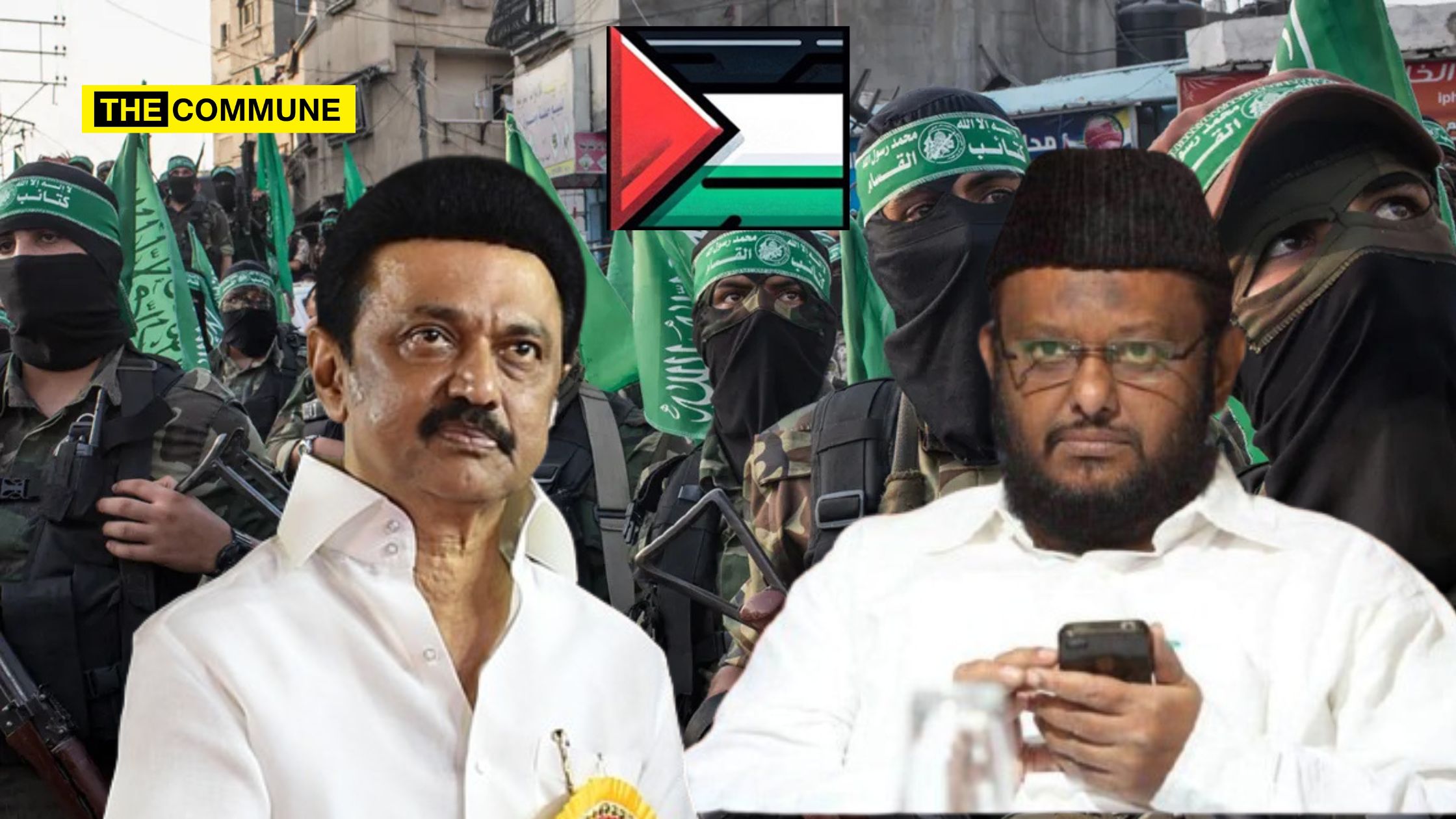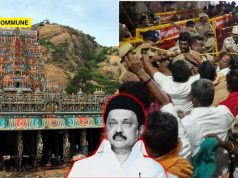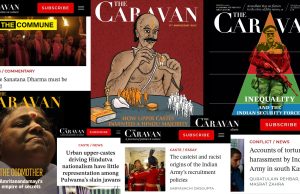
Tamil Nadu’s political landscape is often marked by peculiar statements and ideas that seem disconnected from reality. Recently, M. H. Jawahirullah, the Papanasam MLA and president of the Manithaneya Makkal Katchi (MMK), made a baffling call for the Tamil Nadu government to pass a resolution condemning the Israeli government for the killing of Yahya Sinwar, a Hamas leader and one of Israel’s most-wanted terrorists.
The irony lies in Jawahirullah’s apparent misconception that Tamil Nadu is an independent entity, separate from India, and capable of taking positions on international matters like Israel’s actions. He even went so far as to demand the closure of Israeli businesses in the state, threatening that Tamil Nadu should sever its ties with Israel. This rhetoric raises questions about the extent to which some leaders in the state remain entrenched in ignorance despite Tamil Nadu once being praised for its vast knowledge and intellectual prowess; now seemingly disconnected from the larger reality.
What’s concerning with these political leaders is their hypocrisy of support to “Hamas”, a group designated as a terrorist organization by Israel and many other nations, while simultaneously backing the claims of Sri Lankan Tamils to land in the northern part of Sri Lanka. If these individuals are truly advocating for the “sons of the soil” theory, they should logically support the opposite: the right of people with historical ties to the land to live there.
The Jews, for example, have long had a historical and cultural connection to their land. From being part of the ‘Roman Empire’ during the birth of Christianity, to their exile and eventual re-establishment of Israel as an independent state in 1948, Jews have consistently marked their homeland through history. Their claims to the land are based on a deep historical and religious connection.
However, in Tamil Nadu, this hypocrisy persists as Dravidian parties have allowed divisive ideologies to flourish under the guise of political opportunism and vote-gathering tactics. This has led to an environment where extremist views are nurtured, contributing to a rise in terror-related plots and activities in the state in recent times.
In his latest speech, MLA M. H. Jawahirullah not only spread misinformation but also promoted an artificial narrative, suggesting that Israel will not stop at annexing Palestine and will continue to annex neighboring Muslim states like Saudi Arabia, the UAE, and others. This rhetoric aimed to portray Israel as a villainous state with expansionist ambitions.
He repeatedly peddled the narrative that terrorist organizations and their leaders are, in fact, freedom fighters. Jawahirullah stated, “I would like to point out something very clearly here. Israel has killed many people who joined the Palestinian struggle on a very large scale, and they think that they have finished all of them. For example, to say, in 2004, Israel targeted and killed two of the Hamas founders. Israel said that Hamas was over, but after that in 2007, Hamas captured the places occupied by Israel. So, by targeting the current leader and thinking we have killed the founders of Hamas, and one by one like the current leader the next leader, will these militant groups stop their work? Surely not. Similarly, after Israel killed Abbas al-Musawi, one of the founders of the Hezbollah movement, they thought that Hezbollah was finished. However, Hassan Nasrallah emerged as a stronger leader than Abbas al-Musawi, and today, there is only a point where Israel trembled at Hezbollah.”
At the end of his speech, Jawahirullah stated that they were pressuring the Tamil Nadu government to pass a resolution condemning Israel and supporting Palestine, similar to the one adopted by the Kerala legislature. He added that during the last session, he had already worked with other leaders to pursue this goal, and he would continue to push for it in the next assembly meeting as well.
What was even more shocking was that much like the communists, MMK chief Jawahirullah threatened the Tamil Nadu government. He warned that if businesses run by Israelis were not shut down and the ties between the Tamil Nadu government and Israel were not severed, they would stage protests and target these businesses directly.
Jawahirullah said, “All the companies in Tamil Nadu that are invested by Israel should be closed. How can Tamil Nadu have business ties with a country that not only kills the Palestinian people but also disrespects the UN and its Secretary-General? We will not allow this ever.” Then he threatened the government, saying, “If Tamil Nadu does not take a decision about this and issue a statement, this will not only be a stage speech we will surely protest against the Israeli invested businesses joining all the forces.”
Statements from legislators supporting international terrorist organizations and threatening the government, like those from the DMK, highlight the government’s failure to rein in such behavior. This not only reflects poorly on the administration but also risks portraying the state as a safe haven for such activities.
Israel-Palestine conflict
The Israel-Palestine conflict is incredibly complex, rooted in over a century of history, with deep religious, political, territorial, and cultural implications. Both sides claim they have legitimate grievances, and identifying a singular “wrong” party oversimplifies the situation. Here’s a nuanced breakdown of the perspectives
Historical Context
- The Balfour Declaration (1917) and subsequent British mandate over Palestine played a key role in sowing the seeds for conflict. The declaration supported the establishment of a “national home for the Jewish people” in Palestine, which was already home to a majority Arab population.
- Post-World War II: After the Holocaust, there was increased global support for the creation of a Jewish state, which led to the “UN Partition Plan (1947)” proposing to divide Palestine into separate Jewish and Arab states. The Jewish leadership accepted it, but the Arab leadership rejected it, believing it unfair to the Palestinian Arabs.
- 1948 Arab-Israeli War: After Israel declared independence, neighboring Arab countries invaded, leading to the first of many wars. The result was a victory for Israel, but also the displacement of hundreds of thousands of Palestinian Arabs an event Palestinians call the ‘Nakba’ (catastrophe).
- 1967 Six-Day War: Israel captured the West Bank, Gaza Strip, and East Jerusalem territories that Palestinians claim for a future state.
Key Issues
Territorial Disputes: Israel views the West Bank, Gaza, and East Jerusalem territories as essential for security and historical claims to the land, but the Palestinians claim for a future independent state.
Jerusalem: Marks the birth of Christianity the older home of Jews. Both Israel and Palestinians consider Jerusalem their capital. Israel controls the city as its undivided capital, while Palestinians want East Jerusalem as the capital of their future state.
Refugees: Millions of Palestinian refugees, displaced since 1948, and their descendants, continue to live in camps in neighboring Arab countries, claiming a right to return to their homeland.
Israeli views the creation of the state of Israel in 1948 was a legitimate fulfillment of the Jewish people’s right to self-determination, especially in light of the Holocaust. Israel views its actions as necessary for self-defense against violent enemies, including Hamas, Hezbollah, and other militant groups. Currently attempts at peace such as Oslo Accords, Camp David Accords, and the Two-State Solution have failed due to mistrust, internal political pressures, and entrenched positions with militants and terrorists groups perpetuating the conflict.
Subscribe to our channels on Telegram, WhatsApp, and Instagram and get the best stories of the day delivered to you personally.




